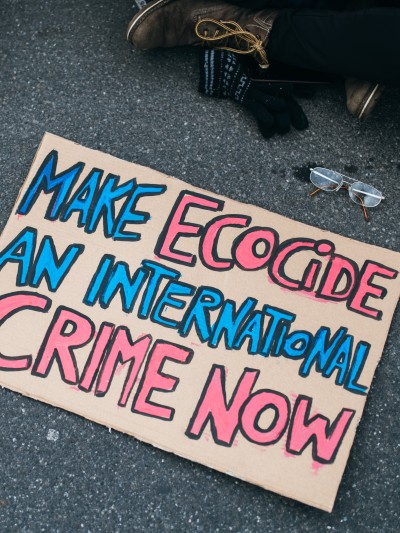With the rising intensity of environmental difficulties ecocide has achieved more widespread recognition and broader awareness. The UN Human Rights Council’s recognition of the right to a healthy environment as a human right in October 2021 constitutes a breakthrough in environmental law understanding. It is no surprise that the world is currently witnessing renewed efforts to legally protect the environment and prosecute those responsible. One of these efforts is to legally recognize and criminalize ecocide. What is ecocide, how does it impact the world today, and what can be done about it?
What is ecocide and how does it affect the world today?
Ecocide is a broad term, the exact definition of which has traditionally been contested. It is generally understood as acts inflicting severe harm to nature that are widespread or long-term and of such magnitude that they could lead to the destruction of whole ecosystems.
The term “ecocide” was first coined in 1970 by professor Arthur W. Galston in a plea for an international agreement to ban the practice. Since then, several other attempts have been made to make ecocide the subject of international treaties, or at least to reach a political agreement. Several other attempts include a proposal by the late Swedish prime minister, Olof Palme, during the 1972 UN environmental conference as well as the life-long lobbying by Scottish barrister, Polly Higgins.
Climate and ecological emergencies are the result of many years of harmful industrial activities. Most of the risks have been known for decades to companies that have chosen to continue with these practices and have put their own profit above all. The responsibility lies with decisions made at the top levels of industry, agriculture, and the financial sector implemented by governments of some of the world’s largest corporations.
Ordinary citizens can and must take responsibility for what they eat and buy, but they do not make those high level investments and policy decisions, the consequences of which often have a negative impact on the environment. Therefore, they cannot be punished for ecocide.
Major examples of contemporary ecocide
Whether the top political leaders agree or not, the scientific evidence points to the conclusion that human activity is a major contributor to climate change. The emission of greenhouse gases and the destruction of ecosystems at the current rate will have catastrophic consequences for the environment. Weather irregularities, increasingly frequent natural disasters, and the fight of coastal communities for survival are just some of the by-products of a global increase in temperature, estimated to rise from 2.1 to 2.9 degrees by 2100. Some scientific projections indicate even more drastic changes.
Today, the world can identify many examples of events that can be considered ecocide – directed actions with blatant disregard to the dangers for the environment. These environmental disasters, whose impacts will be felt well into the future, most notably include the disappearance of the Aral Sea, Fukushima radioactive debris, and the threat to the Great Barrier Reef.
Furthermore, many commercial practices that states and corporations engage in today are profoundly detrimental to the environment and have long-term negative consequences. For instance, the widespread use of pesticides has had a negative effect on crops, birds, and insects, and has also led to the collapse of bee colonies. Hydraulic fracturing, also known as fracking,[1] has seen a pushback from some governments but still thrives in the US. Pollution of waters is often caused by oil spills and illegal waste disposal and is difficult to regulate. Its impact on the fauna and flora inhabiting the world’s oceans is immense.
Wishes turn into actions: growing international support to stop ecocide
The impacts of severe environmental damage affect a large number of countries today and mitigating the climate crisis is becoming increasingly important. This could result in greater support for the implementation of punishment for the crime of ecocide. A prime example is the growing number of island states that are most endangered by rising sea levels. Maldives, Vanuatu, and other small island nations have called for serious consideration of a crime of ecocide at the ICC’s annual assembly of states in 2019, but without much success.
So far, the International Criminal Court (ICC) has been generally silent when it comes to ecocide.[2] Due to increasing public pressure, the Office of the Prosecutor has announced in 2016 its commitment to assess existing offences, such as crimes against humanity, in a broader context. This would include crimes that result in the “destruction of the environment”, “exploitation of natural resources” and the “illegal dispossession” of land. It also included an explicit reference to land-grabbing. The ICC did not formally extend its jurisdiction, only pledged to pay more attention to the environmental dimension of existing crimes in future investigations.
Support for an ecocide law criminalizing mass damage and destruction of ecosystems is gaining momentum around the world, with interest expressed from small island nations, but also European states such as Belgium, France, Spain, and Finland. Pope Francis was among the first to endorse the efforts for ecocide to be made a “fifth category of crimes against peace“ at the International Criminal Court. The effort has since been endorsed by many influential figures, such as French president Emmanuel Macron or Swedish activist Greta Thunberg.
Nationally, several countries have already codified ecocide as a crime. One example is the French Climate & Resilience Act, according to which the most serious environmental offenses can result in 10 years of imprisonment. Belgium is the latest addition to this group having introduced a new amendment to its criminal code which includes the crime of ecocide, albeit with a narrower definition.
The unwillingness of the biggest contributors to climate change, currently India and China, remains the biggest hindrance to the effort. Since these two countries, as well as the US and Russia, are not members to the ICC, any amendments will not constitute a comprehensive solution.
Why criminalize ecocide and how to get there?
In contrast to civil lawsuits and fines, criminalizing ecocide would make those in charge of funding, permitting, or causing severe environmental harm criminally liable. These include the decision-making bodies of both private companies and governmental institutions. Such criminal punishment would create a deterrent that large corporations would not consider as a mere cost of doing business, as opposed to financial sanctions. Some of the biggest offenders, such as CEOs of mining corporations, which as a byproduct of their business endanger all manner of fauna and flora, or even endanger communities in certain countries, would be faced with a prospect of dissolution or even imprisonment. In other words, criminalizing ecocide would give the constant destruction of the environment the gravitas it rightfully deserves.
The benefits of enacting a crime of ecocide in international criminal law are twofold. First, when amending the Rome Statute, the crime of ecocide would be enforceable within existing criminal systems in all member states upon ratification. Integration could therefore be smooth and automatic as no new mechanisms would need implementation.
Secondly, under the universal jurisdiction principle, perpetrators of ecocide could be prosecuted in any of the ratifying countries, regardless of their nationality or where the crime took place. This will correspond with the transboundary effects and consequences of ecocide and make prosecutions faster and more efficient because it could also target corporations from non-ratifying countries.
However, the path to amendment of the Rome Statute is long and challenging. A member state must formally propose an amendment which has to consequently be approved by a two-thirds majority of all member states. Such a degree of endorsement is unlikely at this point in time, but continuous public pressure and the rising intensity of climate change just might steer member states into this approach.
First steps towards amending the Rome Statute?
In 2021, an Independent Expert Panel for the Legal Definition of Ecocide (IEP), made up of an international team of legal scholars and practitioners, was created to develop a concrete idea for a solution to the problem of ecocide.
After six months of drafting and deliberation, in June 2021, the Panel finally presented the long-awaited legal definition of ecocide that should serve as the basis of consideration for an amendment to the Rome Statute. It reads as follows: “For the purpose of this Statute, “ecocide” means unlawful or wanton acts committed with knowledge that there is a substantial likelihood of severe and either widespread or long-term damage to the environment being caused by those acts”.
The team had to tread lightly and abstain from mentioning climate change directly in order not to face immediate opposition from the countries and corporations that are the biggest culprits. According to Phillipe Sands, professor at UCL and one of the panelists, the team opted for “a definition that catches the most egregious acts but doesn’t catch the kinds of daily activity that so many of us, myself included, and regions and peoples and countries are involved in which cause significant harm to the environment over the long term”.
If adopted by the ICC’s members, ecocide would become the fifth international crime, alongside war crimes, crimes against humanity, genocide, and the crime of aggression.
Moving forward
Regardless of the ultimate success of the Panel’s proposal, Sands remains hopeful: “For me the single most important thing about this initiative is that it’s part of that broader process of changing public consciousness, recognising that we are in a relationship with our environment (...) and that we have to use various instruments, political, diplomatic but also legal to achieve the protection of the environment.”
Ultimately, the responsibility for changing the status quo also lies with us, the consumers and voters. Only by frequenting ecocide in public discourse, appealing to politicians, and adapting our purchase preferences, can we put pressure where it is needed and make way for real change.[3]
Notes
[1] Hydraulic fracking, also known as fracking, is a technique for crude oil extraction involving the fracturing of bedrock formations by high-pressure injection of liquid. It is controversial for its environmental impacts which include water pollution and triggering of earthquakes.
[2] With the exception of limited applicability of Art. 8(2)(b)(iv) of the Rome Statute under which the Court could recognize a widespread long-term and severe damage to the natural environment which would be clearly excessive in relation to the concrete and direct overall military advantage anticipated as a war crime. However, the Article limits the scope of applicability to armed conflict situations and is plagued with practical problems.
[3] If interested in learning more or getting personally involved consider following the Stop Ecocide International initiative.
Sources
Haroon Siddique. The Guardian. 2021. Legal experts worldwide draw up ‘historic’ definition of ecocide.
John Vidal and Owen Boycott. The Guardian. 2016. ICC widens remit to include environmental destruction cases.
Ariella Shalev. Foundation for Democracy and Sustainable Development. 2022. Ecocide Law.
The Climate.org 2022. https://theclimate.org/climate-champ-arthur-w-galston-coined-term-ecocide-ecocide-as-international-law-climate-champion-polly-higgins-vanuatu-asks-icc-to-make-ecocide-a-crime/
End Ecocide on Earth. https://www.endecocide.org/en/what-is-ecocide/
Ecocide law. https://ecocidelaw.com
Stop Ecocide International. https://www.stopecocide.earth/about-summary
Independent Expert Panel for the Legal Definition of Ecocide. 2021.
Photograph
Ecocide activism has become an international phenomenon. "Make Ecocide An International Crime Now" sign on the tarmac at a rally against climate change, author: Ivan Radic, March 19, 2021, source: Flickr, CC BY 2.0, edits: cropped.


